Project management positions such as project manager, program manager and project portfolio manager aren’t easy. These roles require a variety of project management skills that are needed to guide project teams throughout the initiation, planning, executing, controlling, and closing of a project.
Project managers are responsible for planning projects, assembling a project team, and managing project tasks, time and costs. To do so, the best project managers use robust project management tools to keep all aspects of their projects organized.
Still, even with robust project management software, that’s a lot to ask of any individual, but project managers have a variety of project management skills to get the job done. But before we continue, what are project management skills?
What Are Project Management Skills?
As stated above, project managers need to plan and control many areas of a project. To do so requires a set of project management skills that consists of personality traits, soft skills, technical skills and hard skills.
Project Management Hard Skills
Hard skills are those project management skills that can be learned through education or training. In project management, hard skills are the most important because they are the project management techniques that allow project managers to do their job. They’re needed to plan, schedule and manage projects.
Project Management Technical Skills
When it comes to project management skills, technical skills are a subset of hard skills that focus on using tools, software and technological processes that are tied to project execution and delivery. For example, while a project manager needs to know how to plan a project, an example of a technical skill would be knowing how to create and oversee a Gantt chart. IT projects require technical skills such as knowledge of programming languages or program architecture.
Project Management Soft Skills
Soft skills aren’t taught anywhere and are developed naturally by individuals. However, some of these can be improved through practice. Soft skills are all those which aren’t learned through formal education or training. Some of these are part of someone’s personality or are developed through the years.
Personality Traits of a Project Manager
As noted, these aren’t exactly skills but personality traits that benefit project managers and their teams. Some personality traits that serve project managers include being responsible and delivering on their commitments. They need to be proactive, problem solvers and, of course, leaders. A project manager should also be open to feedback and even criticism, flexible, but decisive when they need to be.
Who Needs Project Management Skills?
The skills of a project manager extend beyond the traditional project management role. Below are some individuals in an organization who need project management skills.
- Project Managers: Of course, project managers need core skills to succeed in their role. This role oversees all aspects of the project and is responsible for everything from planning to execution to monitoring.
- Program Managers: These strategic professionals focus on the overarching goals and objectives of larger programs. They factor in things like critical thinking and risk management to guide related projects toward success.
- Project Portfolio Managers: Project portfolio managers help oversee and manage a collection of projects and programs in an organization, known as project portfolios. They have leadership skills and problem-solving skills to focus on the entire portfolio of projects at once.
- PMO Directors: These are senior-level executives who lead and manage a PMO within an organization. Key responsibilities include strategic leadership, operational management, change management and more. They require the skills of a project manager and then some.
40 Project Management Skills Every Project Manager Should Have
Below we’ve collected 40 skills project managers should have. Realistically, there are even more project management skills, tools and techniques to master if you want to be a project manager, program manager or project portfolio manager, but if you have these, you have the foundation on which to build a successful career in project management. The 40 project management skills below are divided into three groups:
- 15 Hard project management skills
- 15 Soft management skills
- 10 Technical project management skills
These project management skills can be useful for several purposes. You can include them in your project manager resume and cover letter, and you can use them to prepare for your project manager interview. Or, you could simply study them to learn about technical skills to improve as a leader and project manager.
15 Hard Project Management Skills
Project management hard skills are technical and measurable abilities that a project manager uses to plan, execute and deliver projects successfully. We’ve highlighted 15 hard skills below.
1. Knowledge of Project Management Methodologies
A project manager needs to know about the different project management methodologies that exist. That doesn’t mean that you need to be an expert in all of them, as they’re usually industry-specific and require certification. Here are some of the most common project management methodologies.
If you want to learn more about these and other approaches, check out our project management methodologies blog.
Pro tip: As a project manager, you should be familiar with the project management knowledge areas and project management process groups defined by the project management institute (PMI).
2. Project Planning
Project planning is a necessary project management skill because a project plan is the foundation of the project management cycle. It includes the project schedule, resources and costs. Traditional project management is all about planning. Therefore, the planning stage of any project lays the foundation for everything that follows, including the success or failure of the project.
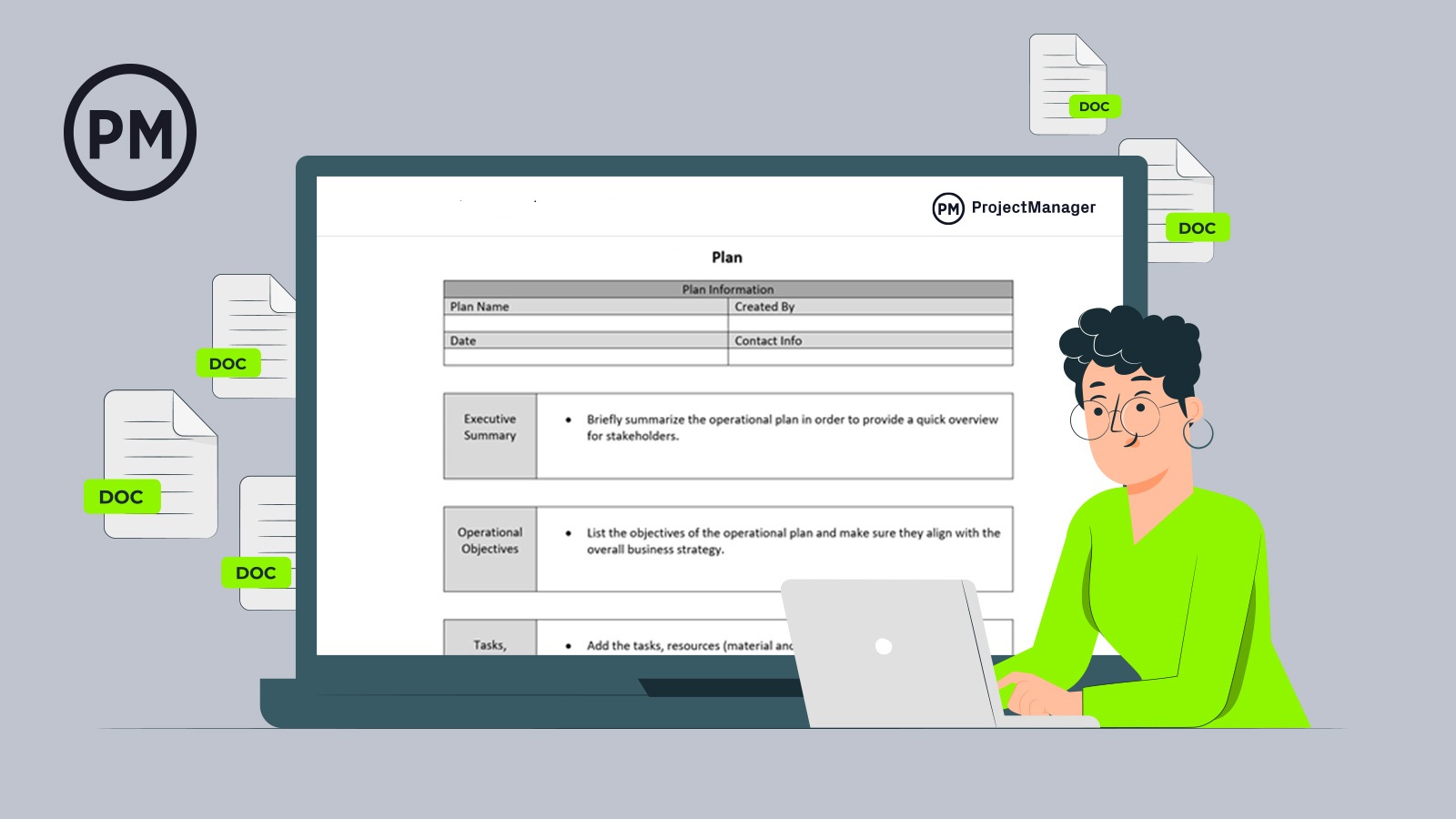
Get your free
Project Plan Template
Use this free Project Plan Template for Word to manage your projects better.
3. Project Scheduling
The project scheduling process is a vital part when writing your project plan. A project schedule organizes tasks, teams and time to complete a project. When people think about project management skills, they’re probably thinking about project scheduling, deadlines and deliverables. But project scheduling is more than that, as it also involves resource management and risk management.
Many tools can help with this process, chief among them a Gantt chart, which provides a visual of the schedule with tasks, durations of those tasks, dependencies, and milestones.
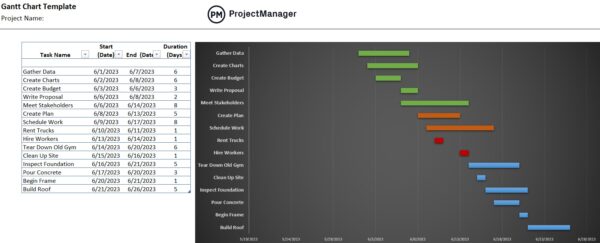
4. Project Scoping
Project scope is the documentation of the project’s goals, deliverables, tasks, costs and deadlines. This document is called a project scope statement and is sometimes referred to as the terms of reference. The purpose of project scoping is to set boundaries for the project, define the roles and responsibilities of the project team and determine the procedures that’ll be employed to execute, test and approve the work of the project.
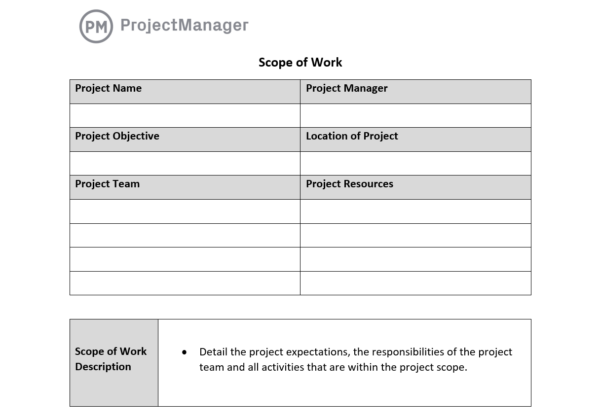
5. Project Forecasting
Project forecasting is the process of trying to figure out potential outcomes in a project. It’s guesswork to an extent but guided by historical data and other research that can help with accuracy. The purpose of project forecasting is to reduce risk, which in turn will increase the probability of success. The process allows project managers to zero in on areas of the project that could be improved to avoid going over schedule, cost overruns and lacking resources when needed.
6. Project Tracking
Project tracking is used to measure progress in terms of the activities involved in a project. It monitors the project to determine if it’s meeting the schedule and, if not, identifies issues that are causing delays and resolves them. This process is important and begins early in the project. Both progress and performance are tracked to stay on schedule and uncover bottlenecks and other issues that are preventing the timely delivery of the project within its budget.
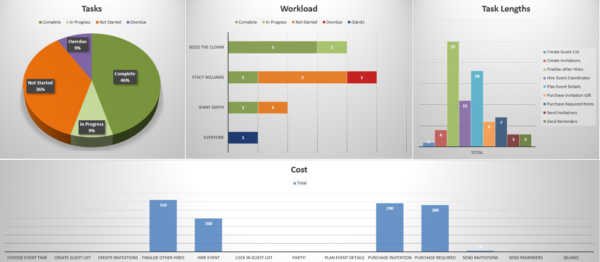
7. Project Reporting
Project reporting is the process of gathering data in an easily understandable format to make sure the project is meeting its goals. Project reports are also valuable tools in presenting information to stakeholders to keep them informed on the progress of the project. It’s a key tool for project managers in making sure the project is successfully delivered.
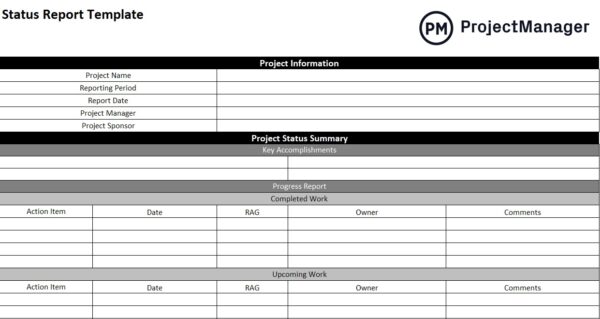
8. Project Budgeting
The project budget is the fuel that drives the project. Project management is all concepts and no action without a project budget. But having a project budget is one side of the project budgeting coin. There’s also budget management, which means tracking costs throughout the life cycle of the project and making sure your actual costs don’t exceed your planned budget.

9. Team Management
Project management is about teamwork, so project managers must have people skills to keep their teams working productively. That means understanding conflict management to keep everyone working together and morale high. It’s always helpful to start projects with team-building activities to help create relationships that will endure the thick and thin of a project.

10. Workload Management
Project managers are also responsible for workload management, which is the process of forecasting, planning, scheduling and monitoring the workload of an individual, team or organization. The goal is to balance workload evenly across your team to have them work at capacity and be more productive. It’s a discipline that involves project management, resource scheduling, capacity planning and much more.
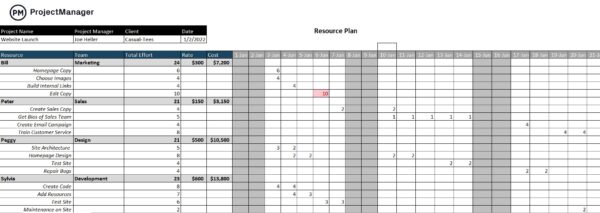
11. Time Management
Time is one of the triple constraints and one of the most important technical skills. Not having time management skills can lead to delays and worse. Project management is about meeting deadlines and getting your deliverables out on time. Project managers have to be experts in managing their time, their team’s time and the overall time of the project.
12. Risk Management
Planning a project, big or small, is inherent with risk. Before executing the project, you have to create a risk management plan to identify, assess, and control risk. The more you can manage risk, the more likely your project is going to succeed.
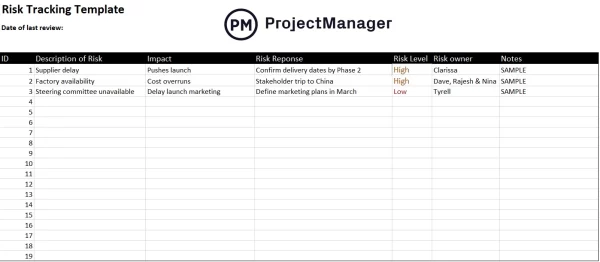
13. Cost Management
Projects cost money. Estimating project costs and creating a budget is part of the planning stage of project management. Once you have a project budget, you have to use budget management to ensure that you control your costs through the execution stage.
14. Task Management
Tasks are little jobs that make up the execution phase of project management. They need to be created, organized, assigned to team members and tracked to make sure they meet the project constraints. This is done with task management. Project management software helps you manage tasks and fosters collaboration among your project team.

15. Change Management
Most project managers expect their projects to go according to plan, but in reality, almost every project plan will need to be changed for a variety of reasons. To manage such changes it’s important to learn how to set up a change management process, which usually involves utilizing a change order request format so that stakeholders can ask for changes, and then assemble a change control board, a group of decision-makers who review those change requests. Then if changes are approved, the project manager needs to secure additional resources to execute the changes and maintain a change log that documents any changes made to the project plan.
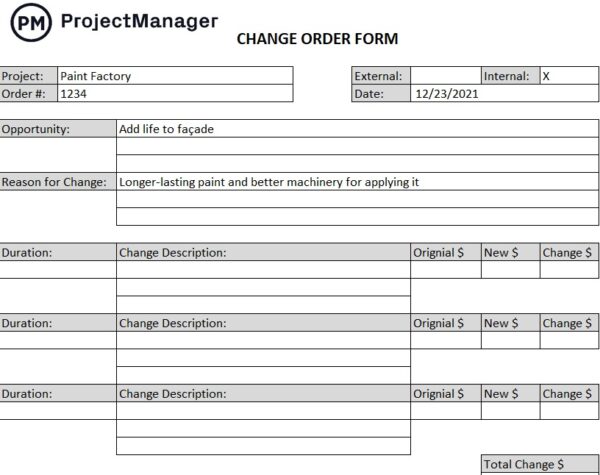
15 Soft Project Management Skills
Soft skills in project management include the personal and interpersonal attributes that make for a great leader and collaborator in a project environment. Below are some examples.
1. Leadership Skills
Some say that leadership is a personality trait or a soft skill that can’t be taught. While some project managers have better people skills than others, we think everyone has the potential to learn how to apply proven leadership skills and techniques.
As a project manager, you’re responsible not only for project success but also need to be a leader who applies leadership skills to guide and motivate team members to achieve their goals.
2. Communication Skills
Communication skills go hand-in-glove with leadership. You can’t be an effective project manager if you’re unable to articulate what it is you need your project team to do. But you’re not only going to be communicating with your team, you’ll need to have a clear communication plan for your customers, stakeholders and contractors.
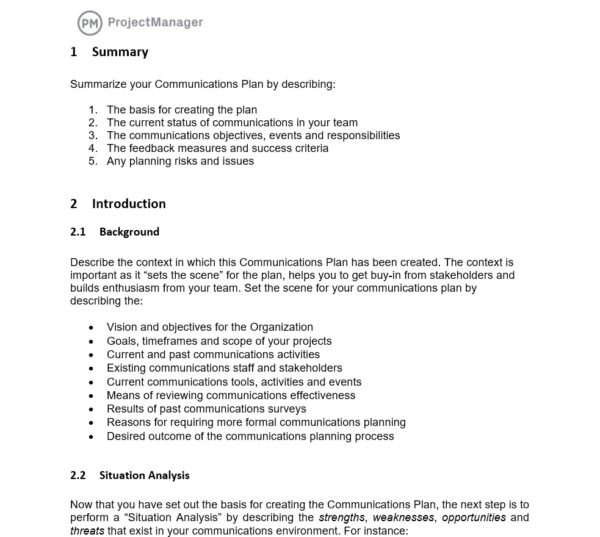
3. Negotiation Skills
Being a strong negotiator is one of many communication skills, but it deserves its own space. In project management, negotiation is an important skill for conflict resolution and stakeholder management. For example, you’ll likely get demands from stakeholders that can impact the project scope. You’ll have to give them pushback, but diplomatically, so all project stakeholders feel they’re getting what they want.
4. Organizational Skills
The term organizational skills refer to the ability of an individual to manage time and tasks efficiently. As the name implies, organizational skills allow someone to work in an organized and efficient manner. These skills are very important for project managers working as part of a project management office.
5. Interpersonal Skills
Teams are made of people and people have personalities. There are many different types of team members and they all have to get along. Having interpersonal skills brings the best out of your project team and helps with conflict resolution.
6. Problem-Solving Skills
Projects are problems, so having the skills to solve those problems means that your project, program or project portfolio is more likely to deliver success. Think of problems as puzzles that you have to figure out. There are many problem-solving tools out there to help you along the way.
Finally, let’s explore some personal qualities or personality traits that are important when pursuing a career in project management.
7. Adaptability
Change is a constant in project management. Being flexible is what keeps a project viable. If you’re not willing to adapt then the project will suffer. Of course, you have to have the wisdom to know when adaptability serves the project and when you have to bite the bullet and push through.
8. Decision-Making Skills
There are always decisions that must be made, often quickly, when managing a project. Project managers must process the situation and come to a decision that will positively impact the outcome of the project. This skill involves being able to properly evaluate whatever options are available, assessing the risks and benefits of those options and choosing the best course of action.
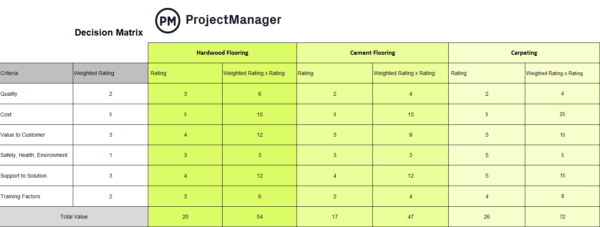
9. Attention to Detail
Projects are made up of tasks that must be completed on time and within budget. This requires a keen eye for detail. Project managers must pay close attention to detail, not only on the task but all the areas that are involved with that task. Being able to focus on those details, no matter how small, is key to project management.
10. Critical Thinking
Too many people understand the basics of project management but can’t think outside of the box. Critical thinking is all about not accepting everything you hear but taking the time to understand the issue and do the research that leads to an informed decision. A critical thinker is more likely to clear the hurdles that every project has to go through.
11. A Sense of Humor
Having a sense of humor is an essential project management skill, even if it’s a soft skill in project management. Humor relieves stress for you and your team, and only when tensions are lifted can smarter actions and ideas show themselves. Project team-building activities are a great example of how humor can be used by project managers.
12. Patience
Nothing is solved by rushing through a project or getting frustrated when things don’t go well. Projects need to be thoroughly planned in order to run smoothly, but that doesn’t mean there won’t be issues. Whether the issue is a change request or stakeholders having unrealistic expectations, if you don’t have patience, everything will be exponentially worse.
13. Personal Appearance
While it might not seem important, especially as the workforce embraces a more casual attire, a professional appearance is still a valuable asset for project managers. Presentation is important. It communicates responsibility, leadership and gives both stakeholders and team members a sense that they’re in good hands.
14. Delegation
Projects are complicated and involve the coordination of many people, places and things. One person can’t do it all by themselves. That’s why delegating is so important. A project manager must know what tasks can be delegated and to whom on the team to keep the work moving forward and distributed among everyone appropriately.
15. Collaboration
Collaboration in terms of project management is no different than the general definition: it’s a group of people working together towards a common goal. Specifically, for a project manager, that’s getting your project team, with its various project skills and experiences, to work better together. This is a discipline that extends across all projects and methodologies.
10 Technical Project Management Skills
Any skills specific to managing projects that involve technology or IT are referred to as technical project management skills. These skills allow project managers to lead and manage technology-related projects.
1. Proficient With Project Management Software
Having a working knowledge of project management software is a must-have technical skill for project managers in today’s world. There are many project management software alternatives available in the market, so you’ll need to determine which project management tools and features are best for you and your team’s workflow.
However, it must be noted that each project management software has its own unique tools, so let’s zoom into the most commonly used project management software features that project management professionals need to master.
2. Gantt Charts
Using a Gantt chart requires the ability to create, manage and interpret Gantt charts, whether they are created using a static document or project management software. It’s a skill that focuses on mastering this visualization tool or technique to improve project scheduling.
3. Project Dashboards
Project dashboards are another example of project management technical skills as these tools are heavily linked to data. Project managers need to understand how to gather relevant data across sources and analyze it to find trends. Taking project dashboards one step further, they also communicate information with stakeholders, so they act as an important tool to keep everyone on the same page.
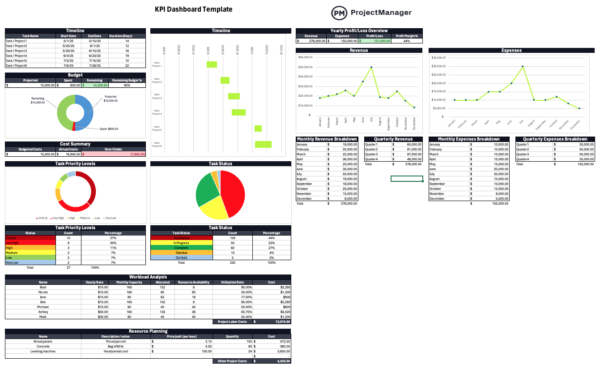
4. Workload Management Charts
Workload management charts don’t necessarily involve deep coding knowledge or intricate software knowledge, they are still considered project management technical skills. Task durations, dependencies and resource assignments all must be entered accurately, which could involve formulas, filters or other data manipulation processes.
5. Timesheets
Timesheets are another example of a technical skill as there are technical aspects to data entry and management. For example, many project management professionals rely on time-tracking software that includes task assignments, reporting options, workload charts and more. Timesheets also integrate with other project management tools that may require exporting data or importing it into other systems.
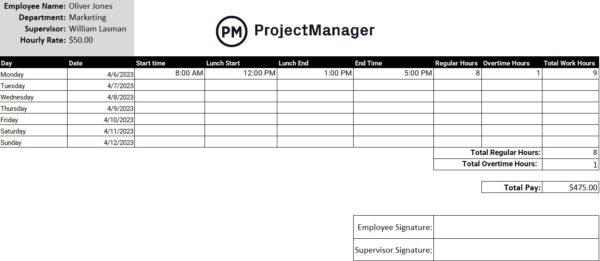
6. Critical Path Analysis
Critical path analysis (CPA) relies on accurate data that includes task durations and dependencies. It breaks the project down into smaller components which requires strong analytical and and problem-solving skills. Many project management software tools have built-in CPA analysis that can automate certain calculations.
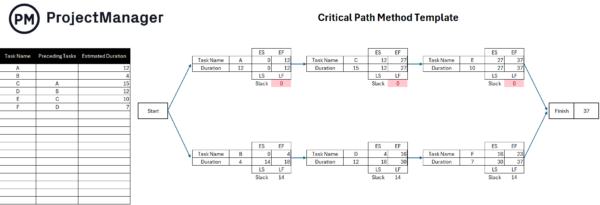
7. Cost and Schedule Variance Reports
Although cost and schedule variance reports may not be purely technical in the sense of programming, they still fall under this skillset. Project management professionals need to collect data, manipulate it, generate reports and communicate any important findings with stakeholders. In some project management software, these types of reports are generated automatically.
8. Workflow Automation
Another example of project management technical skills is understanding how to manipulate workflows for the better. Some project management software options include workflow automation to help establish specific workflows with set approvers. This makes it easier to identify bottlenecks in workflows and ensure quality at every phase throughout the project. Workflow automation requires a thorough understanding of project management software to set up.
9. Project Network Diagrams
Project network diagrams are a visual representation of the sequence and dependencies between project tasks. This is considered a technical project management skill as dependencies need to be identified and the critical path of the project needs to be established. Many project management software options also have built-in project network diagramming tools.
10. Data Analysis
Although data is a key component of any project, data analysis requires technical skills. Project management software does an excellent job of capturing key data throughout the project, but it is useless unless the project manager understands how to interpret and leverage this data. From risk log data to issue logs to creating dashboards and reports, there’s no shortage of ways to use data to navigate the project management process.
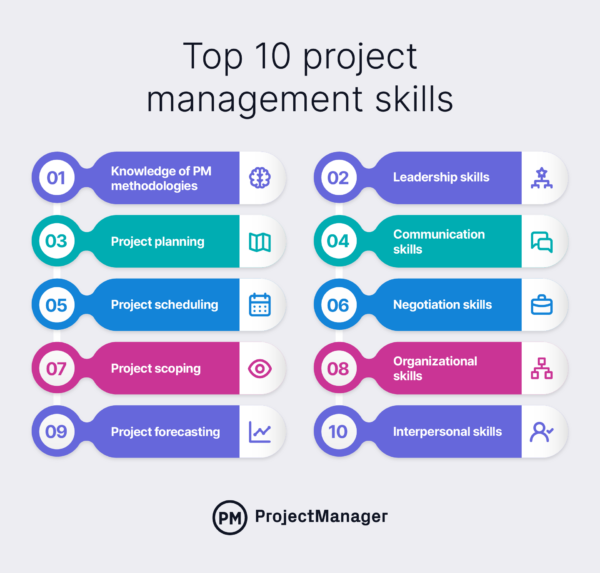
How to Develop Your Project Management Skills
As you can tell, the skills of a project manager are myriad. A project manager might have some of the hard and soft skills already, while others need to learn them. But everyone can improve their project management skills. Here are some ways to develop and improve your project management skills.
Project Management Certifications & Training Programs
There are many project management certifications and with good reason. Certification in any field is like a stamp of approval. It shows that you have learned and have passed a test on certain skills. Project management certification makes you a more valuable asset and is something employers will be looking for on job applicants’ resumes.
Hands-On Project Management Experience
There’s the old debate about which is better, book learning or real-life experience. The truth is that this isn’t an either/or answer. Both are important. You can learn on the job or in the classroom, but a combination of both is always more valuable. Being able to volunteer or work on any project in any capacity will provide you with experience that will make you a more effective project manager.
Project Management Events
Networking is one tool that professionals use to increase their position and knowledge. There are many project management events throughout the year and across the globe, such as those produced by the Project Management Institute (PMI), which offer networking opportunities and educational classes and exhibit new tools of the trade.
Use Project Management Software
Certification, hands-on experience and attending project management events are all going to help you become a better project manager. Project management software is going to help you apply that knowledge and be a more effective project manager. Project management tools help you plan, manage and track projects, manage teams and their tasks, risks and resources.
Improve Your Project Management Skills with ProjectManager
Now that you know what skills you need to be a successful project manager, it’s time to equip yourself with the right project management tools. ProjectManager has a suite of powerful tools that can improve the workflow of any project manager. Here are some of our main features.
Multiple Project Management Views
Project managers are going to use our robust Gantt charts, which can help them plan and schedule their tasks on a timeline. It also links all four types of task dependencies, which helps avoid costly delays, filters for the critical path, to identify critical tasks, and can set a baseline to track progress in real time. But teams don’t need all the features of a Gantt chart, which is why Gantt chart plans can be viewed on task lists, kanban boards and calendars to allow teams to work how they want. All the data across project views are shared in real time so everyone is always working on the same page.
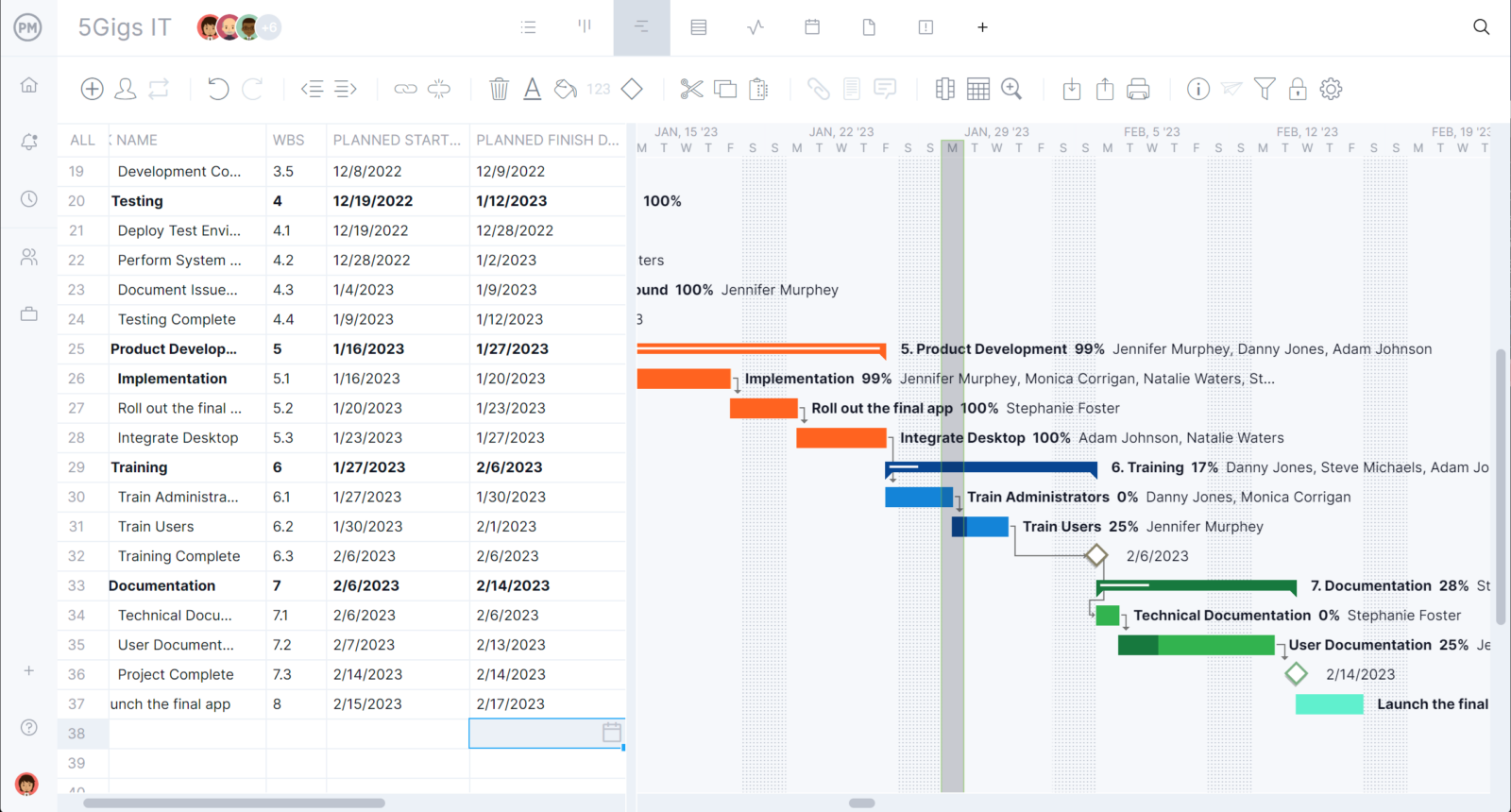
Real-Time Project Dashboards
Monitoring projects is one of a project manager’s main responsibilities. Our real-time project dashboard makes that easy. It automatically collects live project data and displays it on easy-to-read graphs and charts. Project managers get a high-level view of time, cost, workload and much more to keep track of project performance and catch issues quickly. Best of all, there’s no time-consuming configuration necessary as with lightweight project management software. Just toggle over to the dashboard and it’s already working for you.
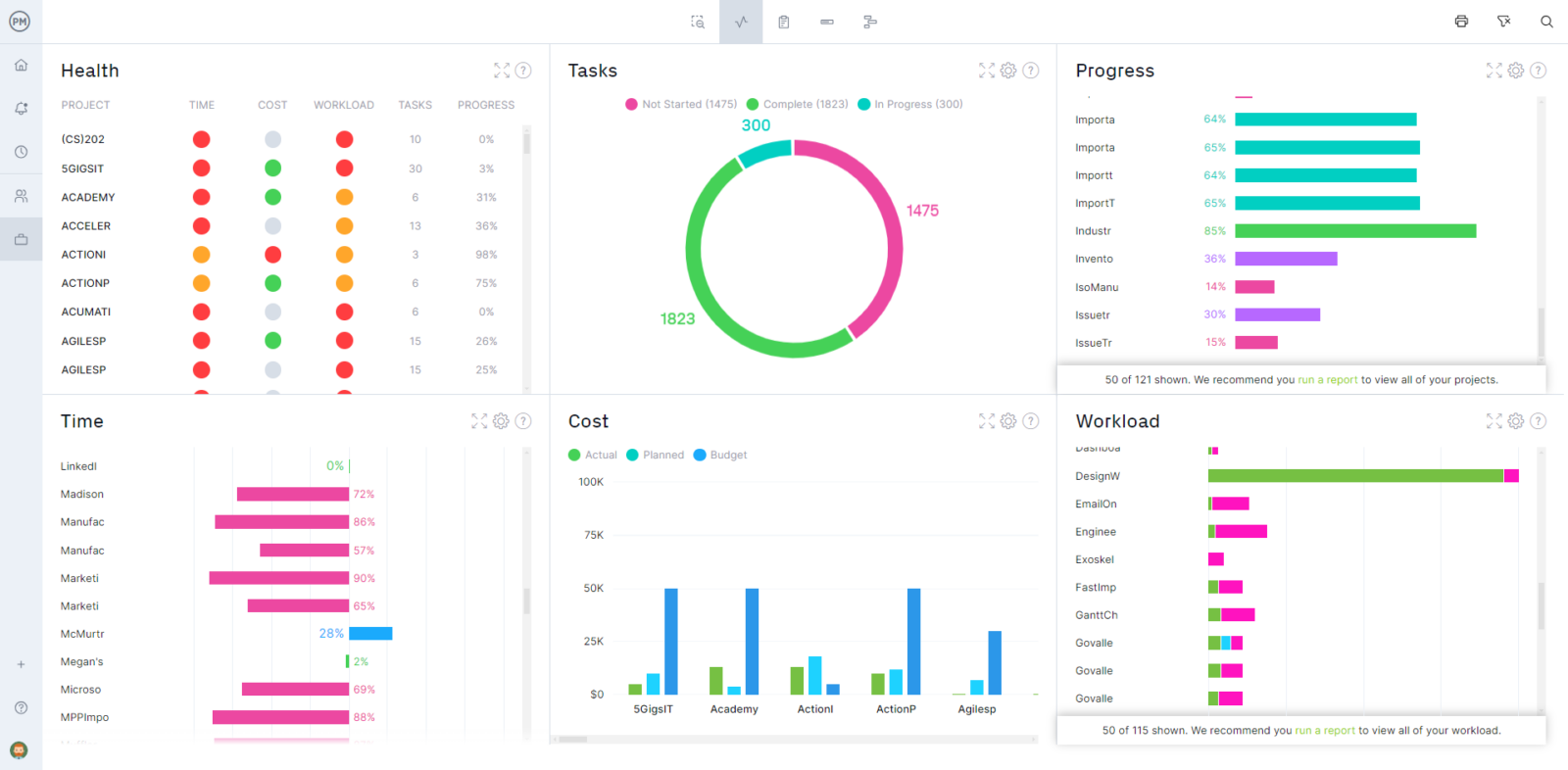
Project Timesheets & Reports
Our software also features secure timesheets that automate much of the process and streamline payroll. They’re also a tool to measure what percentage of your team’s tasks are complete. For more information, you can use our reporting tools. Each report is customizable so you can filter the results to show only what you’re interested in. There are reports on project status, portfolio status, variance and much more. Our reports can be shared in a variety of formats to keep your stakeholders updated.
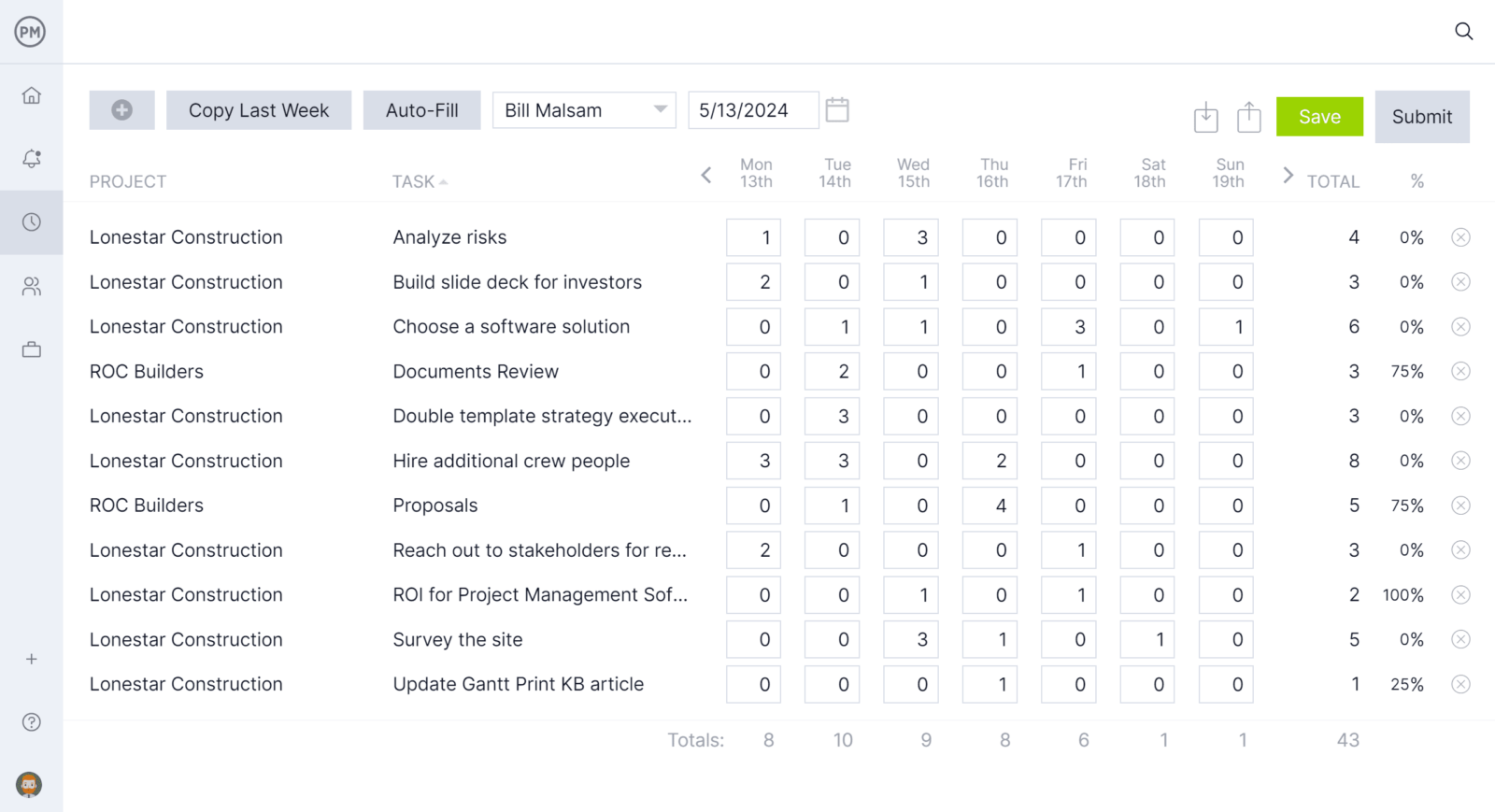
Related Project Management Content
ProjectManager isn’t only powerful project management software that empowers teams to plan, manage and track projects in real time and our website is a hub for online project management information. We publish weekly blogs, guides and videos and offer dozens of free project management templates for Excel and Word that you can download right now. Here’s a small sample of our project management-related content.
- Ultimate Guide to Project Management
- Project Manager Resume
- Project Manager Interview Questions
- Project Manager Job Description
You can have all the soft and technical skills in the world, but without project management software you’ll still be working at a disadvantage. Luckily, some tools enhance your skill set and make you even more efficient and productive. ProjectManager has features to help schedule, manage tasks and budget your project, as well as being online so it’s great for team collaboration. You’ll have to bring a sense of humor, but we’ve got the rest. Try it for yourself by taking this free 30-day trial.

